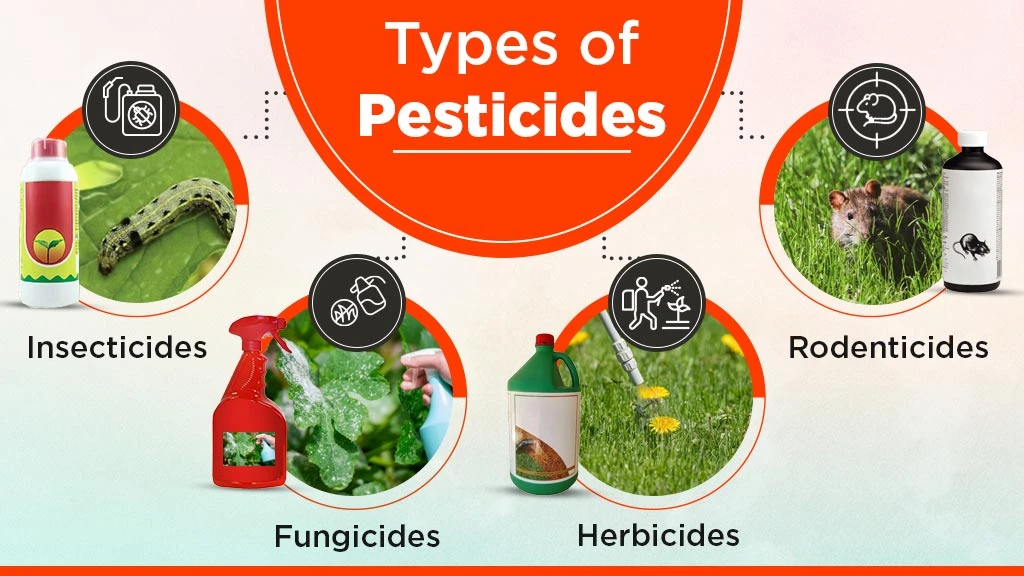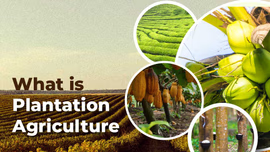Pesticide Used in Indian Agriculture: Types, Status & Benefits

Table of Contents
- What are Pesticides?
- What is the Status of Pesticide Use in India?
- Which are the Top States Consuming Pesticides in India?
- What are the Different Types of Pesticides Used in Agriculture?
- What are the Benefits of Pesticide Use in Agriculture?
- What are Bio-Pesticides?
What are Pesticides?
Pesticides include a variety of chemical compounds for containing or managing pests in particular crop. They are synthetic or natural agents that can eliminate all kinds of pests, including fungi, rodents, insects, and weeds (unwanted plants). They not only prevent vector-borne diseases but also preserve food materials and ensure crop protection. As per the government, pest infestation results in a loss of around 30 to 35% of crop yield in India. Along with this, the rising demand for food security has placed a significant focus on pesticide use. However, its use is highly regulated due to its adverse effects on public health and the ecosystem.
What is the Status of Pesticide Use in India?
Food grain production increased around four times between 1948 and 1997 due to the use of agricultural chemicals, advanced irrigation technologies, and high-yield varieties of seeds. In 2020, the total consumption of pesticides stood at 61,702 tons in India. The main types of pesticides used included insecticides (51.4%), fungicides (32.6%), and herbicides (15.8%).
Compared to global consumption, India used fewer herbicides mainly because of the lower adoption of herbicide-tolerant GMO crops and cheap labour. In 2022-23, 52% of the total cropped area was treated with chemical pesticides. The pesticide usage of India has declined from 0.44 kg/ha in 1990 to 0.37 kg/ha by 2021. It has been mainly attributed to government efforts to minimize dependency on pesticides for high crop yields.
Which are the Top States Consuming Pesticides in India?
According to the official data, there are 318 pesticides registered for agricultural use in India. Also, the Ministry of Agriculture & Farmers Welfare has discontinued or banned 4 pesticide formulations and 46 pesticides for use, manufacture, and import purposes. Following is the list of the top 10 states for pesticide use in India:
|
State |
2021-2023 (Tons) |
|
Uttar Pradesh |
11,690 |
|
Maharashtra |
11,077 |
|
Andhra Pradesh |
6,715 |
|
Punjab |
5,233 |
|
Haryana |
4,061 |
|
West Bengal |
3,527 |
|
J&K |
2,607 |
|
Rajasthan |
2,100 |
|
Karnataka |
1,941 |
|
Tamil Nadu |
1,879 |
What are the Different Types of Pesticides Used in Agriculture?

There are a large number of pesticides available in India; however here we will discuss registered types based on their chemical composition.
Insecticides
Insecticides include a subset of pesticides that are designed to target insect populations and control their infestation. Insects can damage crops as well as cause diseases in humans and livestock. Insecticides provide necessary crop protection by eliminating these pests. It is essential to know about different types of insecticides to develop targeted and effective pest control strategies. Based on chemical composition, some of the popular classifications are:
- Organochlorine (Endosulfan)
- Pyrethroids (permethrin)
- Organophosphorus (Monocrotophos)
- Carbamates (Carbaryl)
- Neonicotinoids (Imidacloprid)
Fungicides
Fungicides are chemical compounds that kill or prevent fungal growth or their spores. Fungi do not have chlorophyll, and thus, they rely on dead organic matter or living plants for survival. They include a variety of symbionts, like blights, mildew, rusts, and mould. Fungi are a significant threat to farming as they develop several diseases in crops. Some of the main types of fungicides are:
- Amide fungicides (carpropamid)
- Aliphatic nitrogen fungicides (dodine)
- Aromatic fungicides (chlorothalonil)
- Dinitrophenol fungicides (dinocap)
- Dicarboximide fungicides (famoxadone)
Herbicides
Herbicides are designed to control or eliminate unwanted vegetation, which is commonly known as weeds. The management of weed growth is important in agriculture as it helps avoid competition for sunlight, water, and nutrients. Thus, herbicides facilitate the optimal growth of crops. They also provide a much more effective form of weed control than hand weeding and cover crops. Following are some main types of herbicides:
- Chlorotriazine herbicides (atrazine)
- Quaternary ammonium herbicides (Paraquat)
- Phenoxyacetic herbicides (2, 4-D)
- Sulfonylurea herbicides (chlorimuron)
- Anilide herbicides (flufenacet)
Rodenticides
Rodenticides are another key type of pesticides that target and kill rodents like rats, mice and porcupines. Rodents are known to damage crops and transmit disease. Rodenticides are usually developed as baits to attract rodents into ingesting toxic substances. They can also harm children and pets, so it is important to use them responsibly and under control. They are mainly categorized as:
- Organic: Coumarin rodenticides (Bromadiolone, Coumachlor, Coumatetralyl)
- Inorganic: Zinc Phosphide, Magnesium Phosphide, Aluminium Phosphide)
What are the Benefits of Pesticide Use in Agriculture?
Most crops would be lost to pests without crop protection. Here are some important benefits of using pesticides in agriculture:
- Using pesticides helps increase crop productivity by allowing farmers to produce more crops with less land.
- They can improve crop yields and prevent post-harvest losses by eliminating weeds, which compete with crops for essential resources like nutrients, water, and air.
- Pesticides allow farmers to produce large quantities of foods at an affordable price.
- It also saves time for farmers as manual removal of weeds or managing other pests is a highly time-consuming task.
- They kill pathogen-carrying vectors to tackle vector-borne diseases effectively. Insecticides are among the most effective ways to eliminate insects that cause deadly diseases like malaria.
What are Bio-Pesticides?
Even though pesticides have helped improve crop yields, they also have caused damage to the ecosystem including poisonous groundwater and soil degradation. Overuse of pesticides has led to long-term health problems in farmers. Punjab has a large population of cancer patients as they use pesticides in the highest quantities considering their area. This resulted in the promotion of biopesticides and to mitigation of the ill effects of chemical pesticides.
Bio-pesticides can be defined as pesticides with biologically occurring compounds that can effectively control various agricultural pests. They are an excellent alternative to synthetic pesticides as they can be sourced from the exudates and essential oils of plants, extracts from leaves, roots and bark, and microbes. In 2022-23, 8% of the total cropped area was solely under bio-pesticide use in India. The use of bio-pesticides is highly prevalent in cereals, vegetables, cash crops, and oilseeds. Following are the popular bio-pesticides in India:
- Bacillus thuringiensis var. (Israelensis, kurstaki & galleriae)
- Bacillus sphaericus
- Trichoderma harzianum
- Trichoderma viride
- Beauveriabassiana
- Pseudomonas fluoresens
- NPV of Spodoptera litura
- NPV of Helicoverpa armigera
- Cymbopogan
- Neem based pesticides
Pesticides are widely applied to crops to kill or control a wide range of weeds, diseases, and pests. This protects them from damage, ultimately increasing crop yields. Also, it leads to better quality of food. There are mainly four main types of pesticides based on chemical composition: Insecticides, Fungicides, Herbicides, and Rodenticides. Even though pesticides benefit crops and agriculture as a whole, they also result in adverse environmental and health impacts. There is a need to adopt sustainable practices like biopesticide use and Integrated Pest Management (IPM) to minimize reliance on chemical pesticides.
Frequently Asked Questions On Pesticides Used in Indian Agriculture
1. What is the need for pesticides in agriculture?
Pesticides are important in agriculture for crop protection against weeds, diseases, and pests.
2. What is the most common pesticide in India?
Benzene Hexachloride (BHC) is considered the most popular and widely used pesticide in Indian agriculture.
3. What are the different types of pesticides?
Based on chemical composition, pesticides are categorized into Insecticides, Fungicides, Herbicides, and Rodenticides.
4. What is Bio-Pesticides?
A biopesticide is a naturally occurring pesticide that is obtained from organic sources, such as plants, animals, bacteria, and minerals.


Related Blogs












